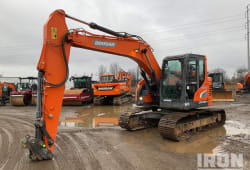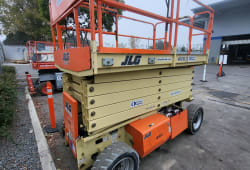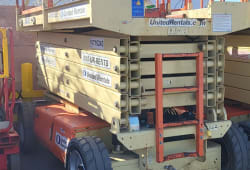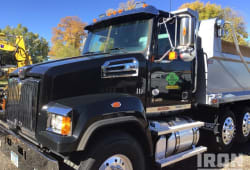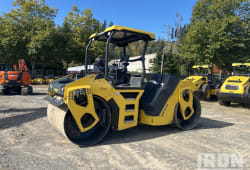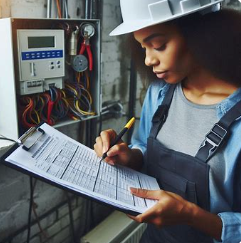Navigating the Future of Heavy Machinery: Diesel vs Electric
9 Min read
)
January 24, 2024
Exploring the Dynamics of Construction Equipment in the Era of Electric Innovation
The construction industry is undergoing a revolutionary transformation with the advent of electric construction equipment. This article delves into the future of heavy machinery, scrutinizing the clash between the traditional diesel-powered giants and the burgeoning electric alternatives.
Understanding the Shift
The Rise of Electric Construction
The construction industry is experiencing a notable shift towards electric construction equipment, marking a significant rise in sustainability practices. The increasing demand for environmentally friendly solutions has been a driving force behind this transformation, leading to a departure from traditional diesel-powered machinery.
This paradigm shift is not only driven by a growing awareness of environmental concerns but also by the benefits that electric construction equipment brings to the table. Electric construction machinery is known for its reduced carbon footprint and lower emissions compared to their diesel counterparts. This shift aligns with the broader global efforts to minimize the environmental impact of various industries.
One of the key advantages of electric construction equipment is its contribution to cleaner air quality on construction sites. Traditional diesel engines emit pollutants and greenhouse gases, whereas electric alternatives produce little to no emissions during operation. This is particularly important in urban areas where construction projects can significantly impact air quality and public health.
Moreover, the adoption of electric construction equipment is often accompanied by advancements in technology, leading to increased efficiency and productivity. Electric machines tend to have lower maintenance costs and can be more cost-effective over their lifespan. Additionally, they are generally quieter during operation, reducing noise pollution on construction sites and contributing to a more harmonious coexistence with surrounding communities.
As governments and industries worldwide intensify their focus on sustainable practices, the rise of electric construction equipment is poised to continue. The construction sector's commitment to reducing its environmental footprint is not only a response to regulatory pressures but also a proactive approach to meeting the expectations of environmentally conscious stakeholders.
Heavy Machinery Evolution
:format(webp))
Exploring the historical evolution of heavy machinery unveils a landscape dominated by diesel engines for several decades. The widespread use of diesel-powered equipment played a pivotal role in shaping industries such as construction, mining, and transportation due to their robustness, efficiency, and power. However, as the need for more sustainable practices grew in prominence, the diesel-dominated landscape faced challenges with the advent of electric innovation.
The dominance of diesel engines in heavy machinery dates back to the mid-20th century when they emerged as a reliable and powerful choice for various industrial applications. Diesel engines offered high torque, fuel efficiency, and durability, making them well-suited for the demanding tasks associated with heavy equipment. This led to their widespread adoption across construction sites, mining operations, and transportation fleets.
Despite their efficiency, diesel engines brought along environmental challenges. They emit pollutants and greenhouse gases, contributing to air pollution and climate change. As global awareness of environmental issues increased, there was a growing need for more sustainable alternatives. This paved the way for the rise of electric innovation in heavy machinery.
Electric heavy machinery offers a cleaner and greener alternative to traditional diesel-powered equipment. Electric engines produce little to no emissions during operation, addressing the environmental concerns associated with diesel engines. Additionally, advancements in battery technology have enabled the development of powerful and efficient electric motors, making them increasingly viable for heavy-duty applications.
The challenges faced by diesel engines in the wake of electric innovation go beyond environmental considerations. Electric heavy machinery often boasts lower operating costs and reduced maintenance requirements, contributing to a more economically attractive option for industries. Furthermore, electric equipment tends to be quieter during operation, addressing noise pollution concerns, especially in urban construction environments.
Comparing Construction Equipment
Diesel Dominance
Diesel-powered machines have long stood as the cornerstone of heavy construction, serving as the backbone of the industry for decades. Their enduring significance is rooted in a combination of factors, including reliability, power, and efficiency. Examining these key attributes provides a comprehensive understanding of why diesel dominance has persisted in heavy construction.
Reliability: Diesel engines are renowned for their robust and reliable performance in challenging working conditions. The design of diesel-powered machines prioritizes durability and resilience, making them well-suited for the rigorous demands of heavy construction projects. The inherent strength of diesel engines contributes to their longevity and ability to withstand heavy workloads over extended periods.
Power: One of the primary reasons for the continued dominance of diesel in heavy construction is the substantial power output these engines deliver. Diesel engines are known for their high torque, enabling them to efficiently handle heavy loads and perform tasks that require significant power. This strength is particularly crucial in construction scenarios where the equipment needs to excavate, lift, or move substantial amounts of material.
Efficiency: Diesel engines exhibit superior fuel efficiency compared to some alternative power sources. This efficiency is especially advantageous in applications where heavy machinery operates for extended durations, as diesel engines can provide substantial power output without frequent refuelling. The ability to cover long distances and operate continuously without constant fuel replenishment enhances the efficiency of diesel-powered construction equipment.
Versatility: Diesel-powered machines are versatile and well-suited for a wide range of construction tasks. Whether it's earthmoving, road construction, or material handling, diesel engines offer the adaptability needed to tackle diverse projects. This versatility has contributed to their widespread adoption across various construction applications.
Infrastructure Support: The existing infrastructure for diesel, including fueling stations and distribution networks, has played a role in maintaining diesel dominance. The established availability of diesel fuel ensures that construction equipment can easily access the necessary resources, contributing to the practicality and convenience of diesel-powered machinery.
The Emergence of Electric Construction
The emergence of electric construction equipment marks a transformative wave of innovation within the industry, addressing environmental concerns and pushing the boundaries of efficiency. The adoption of electric machines brings several advantages to the construction site, ushering in a new era of sustainable and technologically advanced practices.
Environmental Sustainability: Electric construction equipment significantly reduces the environmental impact of construction activities. Unlike traditional diesel-powered machinery, electric machines operate with lower or zero emissions, contributing to cleaner air quality and mitigating the industry's carbon footprint. This aligns with the global push towards sustainable practices and supports efforts to combat climate change.
Reduced Noise Pollution: Electric construction equipment tends to operate more quietly compared to its diesel counterparts. This reduction in noise pollution is particularly beneficial in urban construction environments where minimizing disruptions to the surrounding community is crucial. The quieter operation enhances the overall working conditions on construction sites and fosters a more harmonious relationship with neighboring areas.
Energy Efficiency: Electric machines often demonstrate higher energy efficiency compared to traditional diesel engines. Electric motors can convert a larger percentage of the energy from the power source into useful work, resulting in improved overall efficiency. This efficiency not only contributes to cost savings but also aligns with the growing emphasis on resource conservation and sustainable energy use.
Lower Operating Costs: While the initial upfront cost of electric construction equipment may be a consideration, these machines often boast lower operating costs over their lifespan. Electric motors generally require less maintenance than traditional diesel engines, reducing downtime and associated expenses. Additionally, as the cost of renewable energy sources continues to decrease, the overall operational expenses of electric equipment become increasingly competitive.
Technological Advancements: The adoption of electric construction equipment goes hand-in-hand with technological advancements. Electric machines often feature innovative technologies, such as advanced telematics, real-time monitoring, and automation capabilities. These technologies enhance operational efficiency, provide valuable data for maintenance planning, and contribute to a more connected and intelligent construction ecosystem.
Regulatory Compliance: As governments and regulatory bodies worldwide implement stricter emissions standards and environmental regulations, the use of electric construction equipment positions companies to comply with these evolving requirements. This proactive approach not only helps in meeting legal obligations but also enhances the industry's reputation for responsible and sustainable practices.
In summary, the landscape of heavy machinery in the construction industry stands at a crucial juncture, with the emergence of electric construction equipment challenging the long-standing dominance of diesel-powered machinery. The industry is currently navigating a delicate balance between preserving tradition and embracing innovative, sustainable solutions.
Diesel, known for its reliability and robust power, remains relevant in the construction sector. However, a notable shift is underway, driven by the imperative of sustainability. The industry recognizes the need to address environmental concerns, leading to a gradual transition towards electric alternatives.
The environmental impact of electric construction machines is a key consideration. These machines operate with minimal harm to the environment, contributing to a cleaner construction industry by significantly reducing emissions. This eco-friendly aspect aligns with the growing global emphasis on sustainable practices and corporate responsibility.
As businesses contemplate the adoption of electric machinery, they encounter certain challenges. Initial investment costs, the need for the development of a robust charging infrastructure, and adjustments to the operational nuances of electric machines pose hurdles. Despite these challenges, the industry's commitment to sustainability and the potential long-term benefits of electric equipment suggests a willingness to overcome these obstacles.
In the realm of power and performance, electric construction machines are making substantial strides. They are increasingly competitive in terms of power and torque, challenging the conventional notion that diesel engines hold an exclusive advantage in heavy-duty applications. While diesel engines may still excel in specific scenarios, the overall trajectory points towards electric machines closing the performance gap.
Looking ahead, the future of heavy machinery in construction seems poised for a gradual but definitive transition towards electric alternatives. This evolution is fueled by a dual motivation – environmental concerns that advocate for cleaner technologies and the continuous advancements in electric construction equipment. As the industry embraces innovation, it is likely to witness a transformative shift, marking a new era in the construction sector where sustainability and efficiency coexist in harmony.


